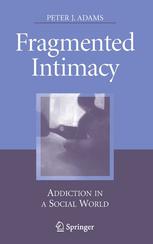

Most ebook files are in PDF format, so you can easily read them using various software such as Foxit Reader or directly on the Google Chrome browser.
Some ebook files are released by publishers in other formats such as .awz, .mobi, .epub, .fb2, etc. You may need to install specific software to read these formats on mobile/PC, such as Calibre.
Please read the tutorial at this link: https://ebookbell.com/faq
We offer FREE conversion to the popular formats you request; however, this may take some time. Therefore, right after payment, please email us, and we will try to provide the service as quickly as possible.
For some exceptional file formats or broken links (if any), please refrain from opening any disputes. Instead, email us first, and we will try to assist within a maximum of 6 hours.
EbookBell Team

4.0
66 reviewsFragmented Intimacy transcends familiar concepts of addiction by focusing not on addicts in isolation but on the social contexts that are disrupted and on the struggle that affects all those involved as they attempt to regroup and initiate change. Applicable to drugs, alcohol, and gambling, this engagingly written book offers both innovative theory and practice-strengthening interventions.
Peter Adams’ social-ecology framework examines in depth how addiction disrupts social identity, becoming the dominant relationship in a person’s life and leading thereby to a weakening of connections to family, friends, workplace, and community. It examines how in the long-term course of an addiction one-on-one counseling will have little effect unless it assists in the re-engagement of these core intimacies. The author enhances the reader’s understanding with vignettes of addicted individuals’ lives as relationships are altered (and insights from such chemically-intimate authors as Burroughs and Poe), new takes on the therapeutic relationship, and examples of families, neighborhoods, and communities mobilizing as powerful forces for re-entry.
A sample of the coverage:
Fragmented Intimacy provides fresh perspective and new tools for frontline addiction counselors, clinical and health psychologists, social workers, and public health professionals while remaining accessible to the researcher or student in these fields. Its focus on the role of intimacy also provides a useful guide to family members in their response to addicted loved ones.